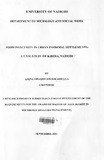| dc.contributor.author | Abdulla, Amina Ibrahim Sheikh | |
| dc.date.accessioned | 2013-02-25T08:32:26Z | |
| dc.date.issued | 2011 | |
| dc.identifier.citation | Rural sociology and community | en |
| dc.identifier.uri | http://erepository.uonbi.ac.ke:8080/xmlui/handle/123456789/11088 | |
| dc.description.abstract | The study focuses on the dynamics of food insecurity in urban informal settlement households in Kibera, Nairobi. Food security in urban areas is linked to the urban dwellers purchasing power as the urban population is highly dependent on the market for all their needs including food. The objectives of the study were to assess food security in the urban informal settlement households; to identify socio-economic factors affecting food security in the urban informal settlement households; to establish the patterns of decision making on matters regarding food security in urban household; to identify coping strategies employed in addressing food security in urban informal settlement households.The study used both quantitative and qualitative techniques to collect both primary data and secondary data. The primary data was collected using personal interviews from the household head or one who makes key decision on matters pertaining food and from key informants. The secondary data was obtained through desk research and review of documents related to food insecurity.
Findings from the study show that households in the urban informal settlements are food
insecure. The factors contributing to food insecurity include low and irregular incomes, the high increase in the prices of basic food items and increase in other necessary non-food expenditures. To address food insecurity, households adopted a number of strategies including skipping of meals, reducing the quantities and diversity of meals, purchasing food on credit, and reliance on assistance from relatives in the rural areas.The recommendations arising from this study are; the need for inclusion of urban vulnerable groups in efforts for mitigating the effect of famine/drought; government should subsidize food in informal settlement areas and fast track the implementation of the recently enacted price control legislation; and finally the need for instituting measures that aim at providing safety nets for poor and vulnerable households that are unable to participate actively in the economy to enable them meet their basic needs. | en |
| dc.description.sponsorship | The University of Nairobi | en |
| dc.language.iso | en | en |
| dc.publisher | The University of Nairobi | en |
| dc.subject | Food insecurity | en |
| dc.subject | Urban informal settlements | en |
| dc.subject | Kibera, Nairobi | en |
| dc.title | Food insecurity in urban informal settlements: a case study of Kibera, Nairobi | en |
| dc.type | Thesis | en |
| local.publisher | Department of Sociology and Social Work | en |

